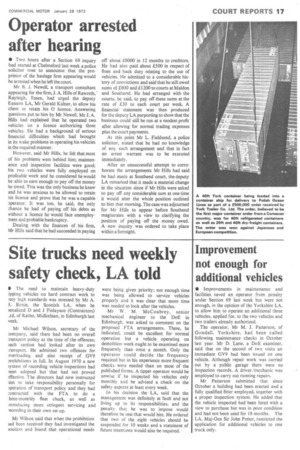Operator arrested after hearing
Page 19

If you've noticed an error in this article please click here to report it so we can fix it.
• Two hours after a Section 69 inquiry had started at Chelmsford last week a police solicitor rose to announce that the proprietor of the haulage firm appearing would be arrested when he left the court.
Mr B. J. Newell, a transport consultant appearing for the firm, J. A. Hills of Rawreth," Rayleigh, Essex, had urged the deputy Eastern LA, Mr Gerald Kidner, to allow his client to retain his 0 licence. Answering questions put to him by Mr Newell, Mr J. A. Hills had explained that he operated two vehicles on a licence authorizing three vehicles. He had a background of serious financial difficulties which had brought in its wake problems in operating his vehicles in the required manner.
However. said Mr Hills, he felt that most of his problems were behind him; maintenance and inspection facilities were good; his two vehicles were fully employed on profitable work and he considered he would be able to earn enough to pay off the money he owed. This was the only business he knew and he was anxious to be allowed to retain his licence and prove that he was a capable operator. It was too, he said, the only :fiance he had of paying off his debts as without a licence he would face unemployment and probable bankruptcy.
Dealing with the finances of his firm, Mr Hills said that he had succeeded in paying off about £8000 in 12 months to creditors. He had also paid about £500 in respect of fines and back duty relating to the use of vehicles. He admitted to a considerable history of convictions and said that he still owed sums of £800 and £1200 to courts at Maldon and Southend. He had arranged with the courts, he said, to pay off these sums at the rate of £30 to each court per week. A financial statement was then produced for the deputy LA purporting to show that the business could still be run at a modest profit after allowing for normal trading expenses plus the court payments.
At this point Mr L. Fieldsend, a police solicitor, stated that he had no knowledge of any such arrangement and that in fact an arrest warrant was to be executed immediately.
After an unsuccessful attempt to corroborate the arrangements Mr Hills had said he had made at Southend court, the deputy LA remarked that it made a material change in the situation since if Mr Hills were asked to pay off any considerable sum at one time it would alter the whole position outlined to him that morning. The case was adjourned for Mr Hills to appear before Southend magistrates with a view to clarifying the position of paying off the money owed. A new inquiry was ordered to take place within a fortnight.
























































































